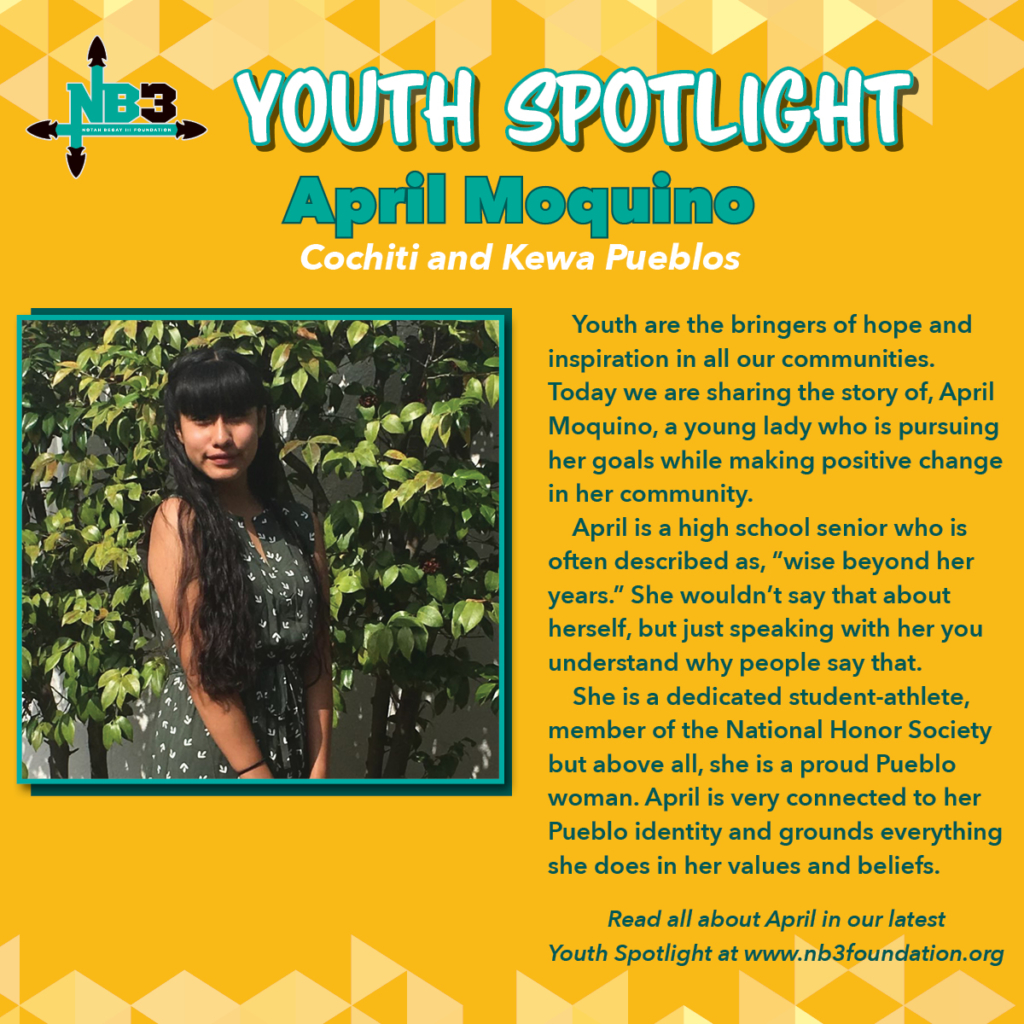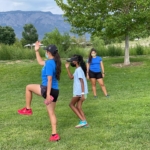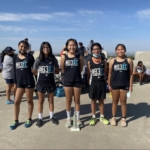Youth are the bringers of hope and inspiration in all our communities. Today we are sharing the story of, April Moquino, a young lady who is pursuing her goals while making positive change in her community.
April is a high school senior who is often described as, “wise beyond her years.” She wouldn’t say that about herself, but just speaking with her you understand why people say that. She is a dedicated student-athlete, member of the National Honor Society but above all, she is a proud Pueblo woman. April is very connected to her Pueblo identity and grounds everything she does in her values and beliefs.
Making an impact on youth
This past year, April completed a project with fellow classmate Makayla Suina, Pueblo of Cochiti. Together they organized a book drive for elementary students in Cochiti and Santa Domingo Pueblos as part of a community service requirement for National Honor Society.
“Community service through the school setting and through the Western view of what community service is, is so different from the Pueblo version of it,” she said. “Yes, I needed the credit, but I wanted it to be something meaningful and not just sending money to an organization … I wanted to do something that would benefit my community.”
Due to the pandemic, the book drive was done almost all virtually. People from all over the country donated books from a list the girls put together specifically geared towards children of color. In June 2021, April and Michaela went to the local community centers to deliver the books to the students.
“Honestly, seeing the smiles from the kids getting something new and different after the whole school year when no one was getting together… It was really heartwarming,” she said.
Sustaining the lands
April says her passion is in environmental justice, specifically through an Indigenous lens. She credits her growth in interest to an internship she has participated in with High Water Mark LLC, a Native-woman owned environmental consulting company based in Bernalillo, NM. During her two years at High Water Mark LLC, she worked on a project with fellow youth interns to bring up concerns against turning Bandelier National Monument into a national park. Which she said would put the surrounding environment, resources and ancestral Pueblo homelands at risk.
April remains invested in the outcome of this project. She says her interest and concerns all come back to the traditional mindset she carries as Pueblo person, which is very conservative when it comes to the land and resources.
“[The youth] are the next generation to care for the lands,” she said. “It is so important to know about the ancestral homelands and what belongs there, what the water resources are, the food resources and the medicine. I don’t think I would’ve fully understood that had I not known Keres as my first language.”
‘It all ties back into the language and who we are as a people’
Keres was April’s first language she spoke as a child and is at the center of all she does. Right now, it is at the forefront of a current barrier she is working to overcome in school. Keres is currently offered as a language course at her high school; however, it does not hold the same rank as other language classes. By taking Keres instead of an honor’s foreign language, April is hindering her class rank. Something that is very important when applying for elite colleges around the country.
“The rank was my first thought; I have to admit. I was hurt and disappointed about that, but there’s something I can still do about it,” she said.
This year, April’s goal is to get her high school to recognize Keres as an honors-level course. She plans to first work with her community and tribal officials before approaching the school board to see if it’s a possibility. She remains hopeful to make the change for future Pueblo students.
“Even if it doesn’t affect me this year, it will be beneficial for kids in the years to come,” she said. “We as Native students shouldn’t have to put our language on the back-burner just so we can get rank status.”
Looking ahead
April is focusing her efforts on getting accepted and attending Stanford University next fall. Her mother attended Stanford, and says she is familiar with the campus and likes what they have to offer in the environmental spectrum. April also has plans on pursuing Indigenous Law here in New Mexico.
“I’m surrounded by a strong Native community and I feel like I can learn a lot,” she said. “My goal learning wise is not just education from the Western world, but to also have that home education, which is another reason I would want to go to law school here.”
April’s mother is Trisha Moquino, from the Pueblos of Ohkay Owingeh, Cochiti and Kewa. She is the co-founder and education director of Keres Children’s Learning Center in Cochiti Pueblo. April’s father is Mario Moquino from Kewa Pueblo a Navy veteran and Heavy Equipment Operator.










